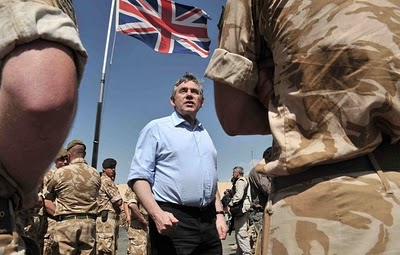Britain's Forged Role in the World
|
|
0 comments
Ats Tsaqofah - Last week Britain's three political parties clashed over the nation's role in the world. The Royal United Services Institute (RUSI), which represents the views of one of the most influential bodies in Britain, found 88% of its members comprising of diplomats, defence and academic analysts, that the UK needs "a radical reassessment of the position it wants, and is able, to play in the world."
Britain's foreign policy and role in the world usually centres on nuclear weapons, terrorism and the special relationship with the US. However in reality Britain's global interests revolve around another set of ideals, colonialism, expediency and hyperbole which successive governments have constantly pursued.
World War Two consumed Britain to such an extent that it brought an end to the British Empire and its international standing. In the post war era, British global aims were restricted by its economic realities. For this reason Britain worked and continues to have a role in the world by partaking in global issues, however it is unable to completely shift the global balance of power. Newsweek said in 2008 "The photographs of Roosevelt, Stalin and Churchill at the Yalta Conference in February 1945 are somewhat misleading. There was no 'big three' at Yalta. There was a 'big two' plus one brilliant political entrepreneur who was able to keep himself and his country in the game, so that Britain maintained many elements of great powerdom well into the late 20th century."
British foreign policy today is built upon having a role in Europe and influencing the US. British policy makers have accepted the nation's weakness after WW2 and developed a policy of preservation rather then direct competition with the US. Britain has managed to achieve its interests through a policy of preserving its global ambitions by working with the US and the EU, whilst at the same time working to divert, alter, complicate and limit the aims of both.
Britain frustrated US plans by rescuing Gaddafi's government from the clutches of American neoconservatives who after September 11 wanted regime change in Libya. Britain also managed to delay the Iraq war by forcing the US to go through the United Nations weakening the US considerably who then went against international law. At the same time Britain worked with the US on the two-state solution in Palestine, on Iran's nuclear enrichment programme and the North Korea issue, but worked against US aims in partnership with Europe in Sudan and Lebanon.
Whether David Cameron or Gordon Brown takes office on May 7th Britain is faced with many facts that it will have to contend with, leaving little ability to manoeuvre. In Iraq the March 2010 elections has not institutionalised the allied constructed political set-up. The various deals the allied forces cut to establish its political solution to Iraq has only remained intact due to allied forces (overwhelmingly American) being present in Iraq. The post election situation is fast descending into chaos as the various factions have found post election Iraq unpalatable. Iraq most certainly is not stabilised.
In Afghanistan the UK has played an ominous role. After eight years of war the western allies are no closer to defeating the Taliban. Whilst all those with interests in Afghanistan met in London to hammer out a deal to entice the Taliban with offers of government positions, Britain appears to have complicated America's presence in South Afghanistan where most of the fighting still continues. The Helmand province where British troops are stationed is still not secure after all these years. It is well known Britain has cut deals with the Taliban in the South and research by the independent Afghanistan Analysts Network, a Kabul-based thinktank, in a report, titled Golden Surrender, was highly critical of the British-backed Peace and Reconciliation Scheme (PTS), established in 2005, which it says has been left to flounder under bad leadership with neither the political nor the financial capital it required.
Whilst the Greek debt crisis once again exposed how fragmented the European Union is, both Labour and the Conservatives view complete isolationism from the EU as unrealistic. Europe is too close and too large to be simply ignored. However the two political parties have divergent views on the EU. The Labour party believe that through engagement London can influence the EU's development and the ultimate direction of its policies. It is not opposed to a European political union, as long as London does not turn into Luxemburg and melt into the EU; it wants a prominent seat at the table of such a union. The Tories on the other hand are for engaging Europe in order to control it. The EU's emphasis on the free movement of goods, capital and people removes government-imposed trade barriers on the free market, which gives Britain's economy an advantage in many fields - it gives Britain's dominant financial sector access to foreign markets. However the Conservatives do not want Britain's big government to be replaced by Brussels. This can only be achieved by ensuring a powerful Europe doesn't become functional.
Whilst Britain's nuclear deterrent continues to be the lens through which the nation's foreign policy is viewed. Britain's nuclear weapons whether the missiles, warheads, switches and factories have all been sold to the US. Whoever comes to power on May 7th will face the prospect of a resurgent Russia and both Iraq and Afghanistan becoming ever more complex. Britain will also face the prospect of both Germany and France further entrenching themselves into Europe after the Lisbon treaty, shaping the EU in their interests. Britain will continue to work with the US in Palestine, Iraq and Afghanistan and continue to alter and complicate US plans in order to keep strengthening itself. This dual sometimes contradictory approach is how Britain keeps itself relevant in international politics. This is what Britain has resigned its role to in international politics; it no longer has the propensity to achieve anything more substantial.
Source : Khilafah.com

![]()
Filed Under:
English Section
Anda dapat turut serta menampilkan artikel anda dalam blog ini dengan mengirimkan email ke :
ats.tsaqofah@gmail.com
ats-tsaqofah@telkom.net
Sertakan pula identitas yang jelas. Terimakasih telah mengunjungi ats-tsaqofah.blogspot.com


.jpg)




0 comments
Trackback URL | Comments RSS Feed